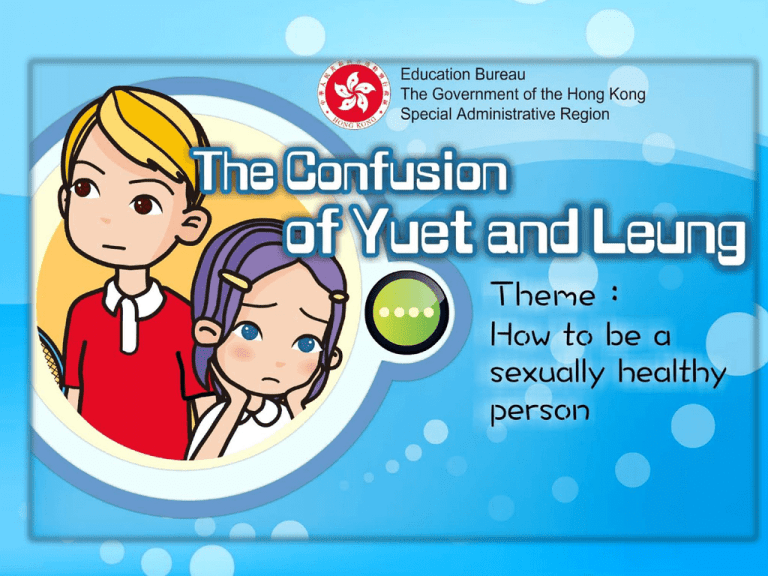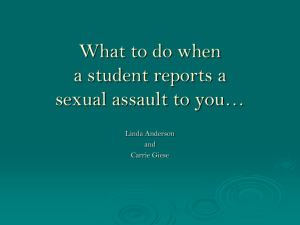
Learning Objectives
1. To understand sex is innate, part of nature, we
should accept oneself positively and naturally
2. To learn what sexual health is about, comprehend
how to deal with various physical and psychological
changes, embrace puberty with a calm manner, and
to develop a healthy lifestyle
3. To know the ways of transmission and other related
knowledge of sexually transmitted infections and
HIV/AIDS
Group Activity
“The Battle on Sexual Health
Knowledge”—How
knowledgeable are you on
sexual health?
Quiz:“How knowledgeable are you
on sexual health?”
1 2 3 4
5 6 7 8
9 10 11 12
13 14 15 16
Quiz: “How knowledgeable are you on sexual health?”
1. Sexually Transmitted Infections mean:
A. Illnesses primarily transmitted by having
sexual intercourse
B. Illnesses that affect the functions of sex
organs
C. Illnesses with defects in sex organs
D. All of the above
Back
Quiz: “How knowledgeable are you on sexual health?”
2. How many liters of a HIV carrier’s saliva
should someone swallow to have a chance
of infection?
A. 1liter
B. 2 liters
C. 3 liters
D. 4 liters
Back
Quiz: “How knowledgeable are you on sexual health?”
3. What is the official name for the STI
nicknamed “Cauliflower”?
A.
B.
C.
D.
Chancroid
Lymphogranuloma Venereum
Genital warts
Genital Herpes
Back
Quiz: “How knowledgeable are you on sexual health?”
4. Which sexually transmitted infection
below cannot be cured?
A.
B.
C.
D.
Syphilis
Gonorrhea
Herpes II
Genital warts
Back
Quiz: “How knowledgeable are you on sexual health?”
5. All of the methods below are capable of
reducing the chance of sexually transmitted
infections, but which one has the best result?
A.
B.
C.
D.
Learn the partner’s sexual history
Use a condom in every sexual intercourse
Have one sex partner only
Reduce the number of sexual intercourse
Back
Quiz: “How knowledgeable are you on sexual health?”
6. HIV infection cannot be detected for a period
of time. How long is it?
A.
B.
C.
D.
One month
Three months
Six months
One year
Back
Quiz: “How knowledgeable are you on sexual health?”
7. Herpes I is not categorized as a sexually
transmitted infection, but what is one of its
symptoms of infection?
A. Burning urination
B. Mouth ulcer
C. Pubic lice found in pubic hair
D. Swollen lymph
Back
Quiz: “How knowledgeable are you on sexual health?”
8. Symptoms of Syphilis infection will:
A.
B.
C.
D.
Be detected easily
Continue to show
Disappear naturally
Make someone happy
Back
Quiz: “How knowledgeable are you on sexual health?”
9. Which one of the following is NOT the main
method of transmission for HIV/AIDS?
A.
B.
C.
D.
Sexual intercourse or oral sex
Sharing injection tools for drug taking
Infected mother-to-child transmission
Hereditary causes
Back
Quiz: “How knowledgeable are you on sexual health?”
10. Which one of the following virus
causes genital warts?
A. HPV
B. HMV
C. HIV
D. HNV
Back
Quiz: “How knowledgeable are you on sexual health?”
11. Generally, how many days is a
woman’s menstrual period?
A.
B.
C.
D.
One to two days
Two to three days
Three to five days
Five to seven days
Back
Quiz: “How knowledgeable are you on sexual health?”
12. What is the color of semen normally?
A.
B.
C.
D.
Creamy
Pale yellow
Creamy or pale yellow
Transparent
Back
Quiz: “How knowledgeable are you on sexual health?”
13. Which of the following skin problems does
not relate to pimples?
A.
B.
C.
D.
Blackheads
Acne
Cyst
Rash
Back
Quiz: “How knowledgeable are you on sexual health?”
14. If your friend has body odor, you
should:
A.
B.
C.
D.
Avoid and keep a distance
Understand and remind him/her
Tolerate and accept
Support and tell others
Back
Quiz: “How knowledgeable are you on sexual health?”
15. If you have a crush on someone, what
should you do first?
A. Learn to get along with that person
B. Wait for that person to tell you his/her
feelings
C. Confirm both as a “couple” as soon as
possible
D. Support whatever decision that person
has made
Back
Quiz: “How knowledgeable are you on sexual health?”
16. If you have sexual fantasy, you should:
A. Think you have mental problems
B. Find ways to deal with your sexual needs
as soon as possible
C. Share your fantasy with others
D. Pay attention if you have become addicted
or not
Back
Conclusions
To be equipped with basic knowledge on sexual health (including
STIs and HIV/AIDS), in order to reduce unnecessary
misunderstandings and the risk of infection.
To learn to protect themselves and their future partner, such as:
• understanding one’s own attitudes to love and intimacy
boundaries
• recognising that promiscuity not only involves ethical issues but
will also increase the chance of contracting sexually transmitted
infections, which not only affects their own psychological and
physical health, but also increases the risk of public health of
the entire community.
The End



